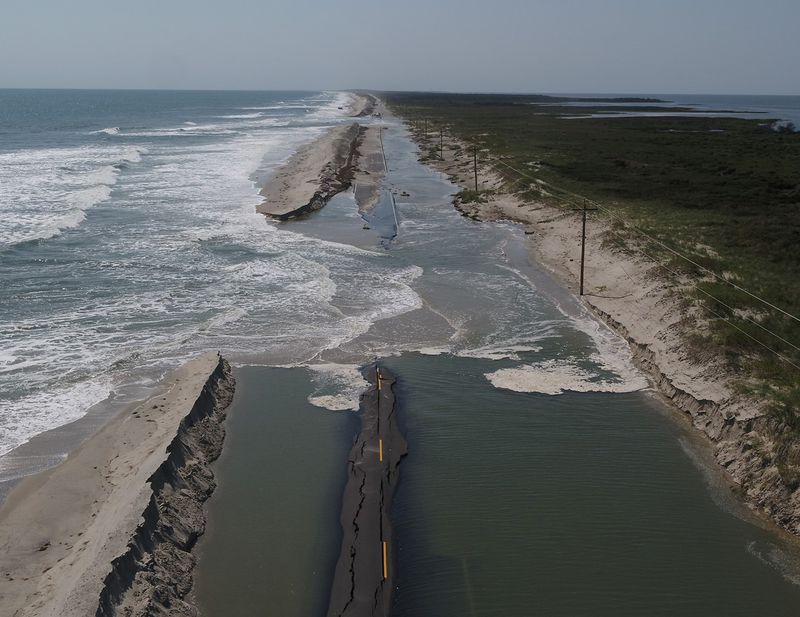
NOAA’s National Centers for Coastal Ocean Science (NCCOS) is allocating more than $4.6 million in fiscal year 2021 to fund research that will inform communities on how to best address sea level rise affecting coastal ecosystems, communities, infrastructure, and surface transportation. The projects will also investigate the effectiveness of natural features or restored coastal habitats to enhance coastal resilience.
The complex challenges of sea level rise, coastal flooding, and increased storm frequency pose increasing risks to our nation’s communities and their surrounding ecosystems. Storm surge and coastal flooding that alters shorelines also represent a significant threat to ports, roads, public transportation and rail.
Approximately $2.5M will cover the first year of five new projects, and $1.6M will go to projects already in progress. Funded under NCCOS’ Effects of Sea Level Rise (ESLR) Program, these awards focus on assessing the performance of conventional engineering approaches versus nature-based approaches to mitigate the effects of sea level rise and inundation on coastal ecosystems and communities. By combining field research with models and tools that can predict vulnerability and resilience, the projects will identify the most effective actions and land management decisions that consider both human and ecological needs.
NOAA is partnering with the Federal Highway Administration to co-fund two of the new projects which focus specifically on science to inform mitigation of sea level rise impacts to transportation infrastructure. This research will evaluate the impact of coastal inundation on coastal road and ferry infrastructure. In addition, the projects aim to improve understanding of how inundation resulting from both gradual changes and extreme events increase the rate of pavement deterioration and trigger pavement failures that require reconstruction. This requires a greater understanding of how overland flooding and groundwater combine to weaken the underlying layers of the pavement structure. These collaborative projects will bring together diverse teams of scientists that include pavement engineers, coastal engineers, ecologists, social scientists, economists, and extension experts.
New Awards:
- Auburn University, University of South Alabama and University of Wisconsin-Madison received $458,892 to develop an approach that evaluates road damage from inundation and the effectiveness of nature based approaches to mitigate inundation impacts.
- University of New Hampshire, University of South Alabama, and Rockingham Metropolitan Planning Organisation received $479,961 to identify primary coastal processes that cause pavement deterioration and damage.
- Texas A&M University Corpus Christi and Louisiana State University received $296,249 to assess sea level rise vulnerabilities and natural and nature-based feature efficacy in the Texas Coastal Bend.
- University of Georgia, Villanova University, and University of South Carolina received $357,657 to identify east coast marshes most at risk to sea level rise, and the value of benefits they provide.
- University of Rhode Island and Penn State University received $375,825 to improve resource management and resilience to extreme events at north eastern National Parks and National Wildlife Refuges.
Continuing Awards:
- University of Wyoming, Point Blue Conservation Science, University of Texas Arlington and U.S. Geological Survey received $249,902 to develop a model that will compare the effectiveness of natural and nature-based features in providing shoreline protection in California.
- Oregon State University received $249,467 to optimize the ecosystem services of U.S. Pacific Northwest coastal beaches and dunes.
- Oregon State University received $245,118 to document the environmental and economic benefits provided by tidal wetlands in the Pacific Northwest, and predict the impact of sea level rise on those benefits.
- College of William & Mary/Virginia Institute of Marine Science, U.S. Army Corps of Engineers and Virginia Commonwealth University received $234,629 to assess the ecological history of dunes in coastal protection from storms and sea level rise.
- George Mason University, Maryland Department of Natural Resources and The Nature Conservancy received $243,153 to enhance models that quantify the benefits of natural and nature-based features in Chesapeake Bay to inform management and conservation under future sea level rise scenarios.
- University of Florida, Florida Gulf Coast University, South Florida Water Management District, U.S. Geological Survey, University of Miami, U.S. Army Corps of Engineers, and Rada Engineering, Inc. received $250,000 to develop a coupled coastal and inland flooding model and a dynamic mangrove vegetation model to assess the role of mangroves in enhancing coastal resilience.
- U.S. Geological Survey, Louisiana State University, and University of Georgia received $259,076 to advance coastal dune and marsh modeling of the barrier islands, estuary and interior marshes in the Mississippi Sound to evaluate tradeoffs between potential coastal management strategies and proposed restoration efforts in the region.
- University of North Carolina (Chapel Hill), U.S. Army Corps of Engineers, and EA Engineering received $187,473 to develop a framework and process for matching dredging needs with opportunities for beneficial use of the sediment at local marshes, to help marshes keep up with sea level rise, allowing marshes to continue to deliver ecosystem services to their region. The project will focus on marshes in both Beaufort (NC) and Jacksonville (FL).
A full list and summary of new grant awards is available online. The overall goal of ESLR is to facilitate informed adaptation planning and coastal management decisions through a multidisciplinary research program. These awards contribute to a larger NOAA effort to provide science to inform decisions, conserve priority ecosystems, and advance the use of natural based infrastructure to mitigate the effects of coastal hazards.
